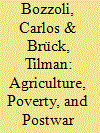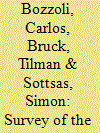|
|
|
Sort Order |
|
|
|
Items / Page
|
|
|
|
|
|
|
| Srl | Item |
| 1 |
ID:
088356


|
|
|
|
|
| Publication |
2009.
|
| Summary/Abstract |
This article analyzes the effects of household-level activity choices on farm household welfare in a developing country affected by mass violent armed conflict. The study uses household survey data from postwar Nampula and Cabo Delgado provinces in Northern Mozambique capturing many activity choices, including market participation, risk and activity diversification, cotton adoption, and social exchange, as well as income-and consumption-based measures of welfare. The study advances the literature on postwar coping and rural poverty at the micro level by estimating potentially endogenous activity choices and welfare outcomes using instrumental variables. The study finds that increasing the cultivated area and on-farm activities enhances postwar welfare of smallholders exploiting wartime survival techniques. Subsistence farming reduces income but does not affect consumption, while market participation has positive welfare effects. This suggests that postwar reconstruction policies should encourage the wartime crop mix but offer enhanced marketing opportunities for such crops. Cotton adoption, which was promoted by aid agencies in the postwar period, reduces household welfare per capita by between 16% and 31%, controlling for market access. This contradicts previous studies of postwar rural development that did not control for the war-related endogeneity. Hence, addressing the potential endogeneity of activity choices is important because the standard regression approach may lead to biased estimates of the impact of activity choice on welfare, which in turn may lead to biased policy advice. The article discusses and contextualizes these findings, concluding with a discussion of suitable pro-poor reconstruction policies for national governments and donors.
|
|
|
|
|
|
|
|
|
|
|
|
|
|
|
|
| 2 |
ID:
120120


|
|
|
|
|
| Publication |
2013.
|
| Summary/Abstract |
Many Colombians are confronted with the ongoing conflict that influences their decision making in everyday life, including their behavior in labor markets. This study focuses on the impact of violent conflict on self-employment, enlarging the usual determinants with a set of conflict variables. Our estimation strategy compares three different estimates: one from fixed-effects panel data (OLS-FE), estimates using lagged conflict indicators instead of contemporaneous regressors, and instrumental variables (IV-FE) estimates. Our results show that a one standard deviation increase in net displacement rates increases the rate of self-employment by about 7 percent points. Dividing the self-employed into different sectors (services and agriculture), we find that net displacement increases self-employment in the services sector but has no effect in agriculture that is affected by attacks by rebel and paramilitary groups, instead. Looking at the income of self-employed individuals, an influx of displaced reduces sharply hourly income in the self-employment sector.
|
|
|
|
|
|
|
|
|
|
|
|
|
|
|
|
| 3 |
ID:
095045


|
|
|
|
|
| Publication |
2010.
|
| Summary/Abstract |
This paper defines the global economic costs of conflict and suggests two key criteria, namely comprehensiveness and consistency, which are necessary for a valid calculation of such costs. A critical review of the literature reveals that most studies focus on national income losses, using counterfactual regression models, finding a negative impact on growth both for conflict countries themselves and for their neighbors. However, the debate is quite fragmented and the literature fails to combine these insights in a comprehensive and consistent manner. Furthermore, there is little work thus far on integrating aggregate and micro-level estimates of the costs of conflict.
|
|
|
|
|
|
|
|
|
|
|
|
|
|
|
|
|
|
|
|
|